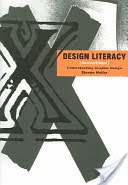Design Literacy: Understanding Graphic Design
A trio of books recently published by Allworth Press offer a compact self-study course on the practice and appreciation of graphic design. The books . . . are intended as an alternative to the diet of eye candy that sustains many graphic designers. Of the three, only Design Literacy is illustrated, and that only sparingly, with black-and-white thumbnails. The message? Look with your brain first -- Metropolis, April, 1998
Each lesson could act as the starting point of a rousing argument or lengthy conversation. . . . Any modestly-priced paperback that can cover so much ground is welcome in the library. The reader may not always agree with the views of the authors, or with the histories they construct, but will come away feeling, indeed, very literate -- Communication Arts, March/April, 1998
Highly readable and informative, usually focusing on one object and providing some interesting insights into the object's creation and impact. Students of graphic design history will find appealing analysis and critical points of view to consider. Design Literacy will appeal to both the general reader, whose curiosity may be piqued by recognizing some of our most famous icons, and professionals/practitioners, whose knowledge and sensitivity to design may be heightened by these thoughtful essays -- Choice, March, 1998
Highly recommended. . . . In the past several decades various authors have objected to approaches to graphic design history that focus on individual masters, movements, and styles; that analyze the structural attributes of a work . . . or that feature highbrow examples while leaving out simpler, more popular works. This volume, which is one of the more inventive and thought-provoking books on design history in recent years, offers a plausible alternative: It consists of 93 "object lessons" in the form of engaging short essays about a wide variety of graphic icons, from the late 19th century to the present, ranging from the ubiquitous (shooting targets, the swastika, Joe Camel) to the esoteric (Emigre magazine, the Cranbrook posters, or April Grelman's self-portrait). Organized somewhat chronologically but in eight thematic categories (Persuasion, Media, Language, Identity, Information, Iconography, Style, and Commerce), the essays form readable "stories" about the objects, the designers' thought processes, and the social and political circumstances from which they emerged -- Ballast Quarterly Review, Autumn 1997
In their new book, Design Literacy, Steven Heller and Karen Pomeroy write that the whiff of Charles Manson makes the letters "kissing cousins of the swastika tattoo carved into Manson's forehead or the words helter-skelter that were drawn in blood on the walls of Sharon Tate's home" -- New York Times, January 8, 1998
Its great virtue is that it offers a lot of information and raises many provocative issues while avoiding the windy theoretical jargon that sometimes passes for serious thought in the field. . . . Nobody has been more successful than Steven Heller in reminding us that graphic design has a history and that it raises issues worth talking about. . . .
The implicit argument of Design Literacy is that even imagemakers have to slow down occasionally to think non-visually about what they do. Graphic design has a past, and designers' actions have consequences. It's an important cultural activity, and those who practice it need standards that go beyond communicative brute force -- Print, April, 1998
Readers come to understand what elements must coalesce to make certain ads, posters, packages, logos, and book covers take on a life of their own. The book delves into the origins of the swastika, what principles are key to effective propaganda, and what made Joe Camel so controversial -- Signs of the Times, July 1998
Steven Heller and Karen Pomeroy's Design Literacy is a winner: a guide to graphic design which presents over ninety object lessons examining the contexts in which works have made contributions to the field of graphic design. Design stories provide plenty of insights on how design works and how the field has been transformed by creative individuals -- The Bookwatch, November, 1997
This book intends to fill in some blanks and at the same time give an eclectic overview of the way graphic designs from the earliest decades of this century to well into the 1990s have become essential and influential images of not just graphic design culture, but of our culture at large. . . .
What is refreshing in Heller's book is his reverence for the lesser-known gods of graphic design history . . . [and the] wealth of case histories. Heller is at his best in concise stories such as these: funny, to-the-point, and erudite. . . . An interesting introduction to a design connoisseur's tastes -- Eye, March, 1998
Product Description
This is the first book to provide explicit case histories of the successful marriage of form and content in graphic design. It explores nearly 100 classic and contemporary works and explains why they are aesthetically significant and how they function as good design. By focusing on the study and appreciation of specific works, Design Literacy breaks new ground and will be of interest to students and designers at all levels.
About the Author
Steven Heller is a senior art director at the New York Times and the chair of the MFA design department at the School of Visual Arts. Editor of the AIGA Journal of Graphic Design, he is co-editor of Looking Closer: Critical Writings on Graphic Design, Looking Closer 2, and Design Culture, all published by Allworth Press. He lives in New York City.
Karen Pomeroy is a Los Angeles-based graphic designer and writer. She is co-author of Designing with Illustration.

